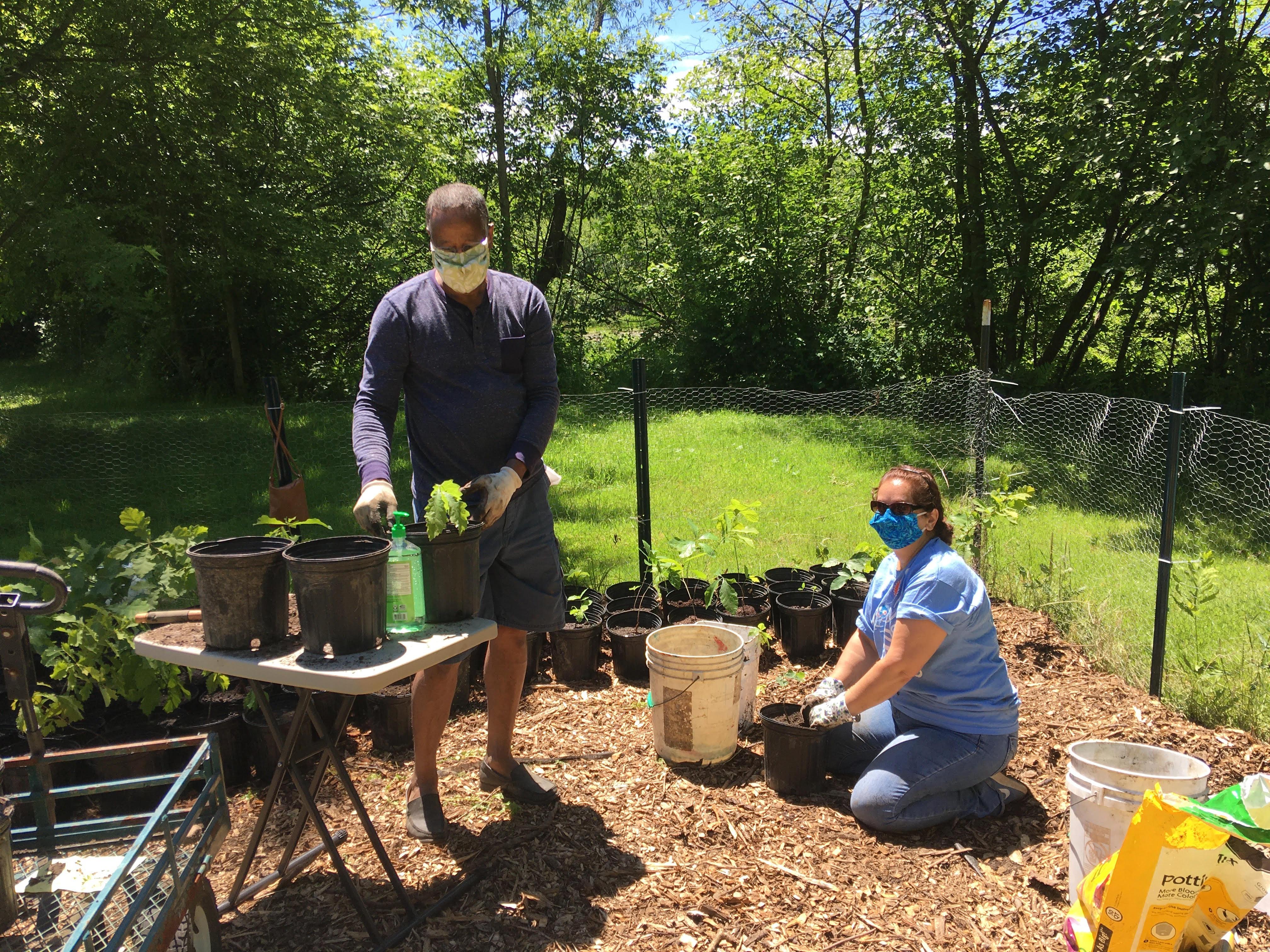Kamal Mohamed, Rice Creek Field Station director, and Laurel Artz, Rice Creek Association president, transplant tree seedlings as part of the Canal Forest Restoration Project.
For the second year in a row, members of the public are invited to celebrate National Arbor Day with the Canal Forest Restoration Project (CFRP) team at Rice Creek Field Station via a free online webinar conference on Friday, April 30.
The conference lineup includes six 45-minute webinars offered between 9 a.m. and 4 p.m. on April 30.
Speakers hailing from as close as the city of Oswego and as far away as the Chicago Botanic Garden will highlight different projects and perspectives on forests, trees and the environment, from history to art, grass-roots reforestation to fostering connections between people and plants, and two perspectives on maple sugaring.
Interested participants can sign up for one or more webinars online at bit.ly/OzArborDay. Recordings will be posted to the project’s YouTube channel the following week for those unable to join the live event. SUNY Oswego students who attend are eligible to take home a free tree at the end of the semester.
The conference lineup includes:
- 9 a.m.: "A year in review: Canal Forest Restoration Project 2020." Despite the challenges of 2020, the CFRP team, including Rice Creek Field Station staff, SUNY Oswego students and project partners, had a successful season growing, planting and giving away trees. Hear stats from 2020, see new educational materials and get updated on the program's infrastructure improvements, volunteer contributions and donations. Organizers will also discuss progress and tree giveaway plans for the 2021 season.
- 10 a.m.: "Book Talk on 'Seeds: One Man's Serendipitous Journey to Find the Trees That Inspired Famous American Writers from Faulkner to Kerouac, Welty to Wharton.'" Award-winning local author Richard Horan went on a quest to locate still-living trees that influenced American authors of the past, collect seeds and grow them to start a new generation from these illustrious mother trees. In this talk, Horan describes his ambitious project, which served as the basis for his book "Seeds," as well as the people who helped make the project and book possible.
- 11 a.m.: "Maple Syrup: Forest Foods for a Sustainable Future," by Aaron Wightman from the Cornell Maple Program. Maple syrup isn't just a delicious treat. When you choose real maple syrup over other sweeteners, you also support a form of sustainable food production known as agroforestry. Popular sugar crops such as beets, sugar cane and corn all have negative environmental impacts including habitat fragmentation and polluted waterways. In contrast, maple syrup is produced from intact forest ecosystems that retain all their value for wildlife habitat, carbon sequestration and water filtration. This presentation will discuss the rapid growth of the maple products industry and the role of agroforestry in a sustainable future.
- Noon: "Made In Oswego: From Tree Tap to Table," by Kate Spector, Deiarra Canty and David Victome from the SUNY Oswego Sustainability Office. Trees are one of the most valuable resources, as they provide fresh air to breathe, shade on hot summer days and delicious sap to help satisfy a sweet tooth. The college's pilot maple tapping project was a fun and educational opportunity to sustainably collect tree sap for consumption. The audience will hear all the details of what worked, what didn’t work what the group learned and any plans for future expansion. The tree tapping process is very DIY-friendly and organizers hope that this project will encourage others to try it out for themselves at home.
- 2 p.m.: "Interactions of Art, Ecology, and Biology: Hybrid Matter and Sustainable Art Practices and The Plant Image as Method," by Darya Warner and John Santomieri from the University at Buffalo. Hybrid Matter is a series of traveling site-specific temporal sculptures that address local sites, their history and ecology. The project initiates a dialogue on sustainable art practices and the collaborative possibility of art and science as executed by using an open-source 3D bioprinter, MycoPrinter. MycoPrinter prints locally sourced substrate ready for inoculation with various types of fungi to create a living sculpture. The Plant Image as Method breaks down image-based perception of plants and the natural environment. By surveying plant representations in media and popular culture, this presentation will question their significant presence in media-based expressions, and contemplate the human/plant relationship within larger social contexts.
- 3 p.m.: "Plant Love Stories," by Rebecca Barak (Chicago Botanic Garden) and Caitlin McDonough MacKenzie (University of Maine and Colby College). Plant Love Stories is a project started by conservation scientists that celebrates the emotional connections between people and plants. The project collects and shares stories about plant love from scientists, students, gardeners, outdoor-enthusiasts and even self-proclaimed plant-haters. Presenters are excited to spread the plant love this Arbor Day and tell stories about how their project germinated, sprouted, and grew.
This conference is offered as part of Earth Month at SUNY Oswego, hosted by the campus Sustainability Office. Thursday, April 22, eight days before the conference, marks the 51st anniversary of Earth Day.
SUNY Oswego’s Rice Creek Field Station is dedicated to being a living laboratory for the advancement of knowledge through ecological research, education, and stewardship of the natural world. In 2019, Rice Creek partnered with the Canal Forest Restoration Project to grow and distribute native trees that were heavily logged to support New York’s canal industry, including white oak, swamp white oak, burr oak and white pine, restoring these trees to the region.
Find additional details about the webinar, the Canal Forest Restoration Project and how to support the project on Rice Creek Field Station’s website, www.oswego.edu/ricecreek.




